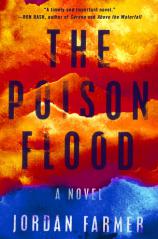The Poison Flood
Review
The Poison Flood
There is a moment in Jordan Farmer’s darkly brilliant and beautifully written sophomore effort that is almost prescient. It comes in the novel’s first half and consists of a vignette that illustrates how some people react in the face of a disaster. Given how the publishing industry functions, it is safe to assume that Farmer finished this book months before the coronavirus pandemic broke out, which has resulted in occurrences similar to those that he describes. But even without this illustration of how life and art intersect, THE POISON FLOOD would be memorable thanks to his keen eye and sharp wordcraft.
Farmer writes of the poor, the downtrodden, and the physically and emotionally misshapen in his home state of West Virginia. His primary focus here is on Hollis Bragg, the orphaned son of a West Virginia preacher. Impaired as the result of a spinal deformity, Hollis is a study in contrasts. He lives almost off the grid, in the shadow of his father’s burnt-out church and next to a farm that raises chickens for cockfights. However, Farmer is not giving us a retread from TOBACCO ROAD.
"[Farmer's] similes, metaphors and turns of phrase are worth underlining and rereading over and over. They are equaled, if not exceeded, by his sharply drawn characters, who you will remember long after you finish this book and probably many others."
What is unknown to almost everyone is that Hollis is a gifted composer who has ghostwritten several major hits for The Troubadours, which evolved from a band that he helped start with his girlfriend, Angela, a few years ago. Hollis left the group on the cusp of its initial success for reasons that are gradually revealed in fits and starts throughout the narrative. He watches Angela and her stardom from afar while quietly cashing the checks he is paid for his songs.
Hollis’ relatively peaceful existence begins to crack when he is discovered by Russell Watson, a local musician whose father heads up a chemical company that has attracted the ire of a number of radical environmentalists who have launched a series of protests. Still possessing some adolescent rebellion, Russell has befriended a charismatic and dangerous character named Victor, who is constantly prodding him to prove himself for “the cause.” Things take a very unpredictable turn, resulting in an environmental catastrophe that affects the entire area and culminates in Hollis witnessing a murder that puts him in danger from a couple of sources.
The disaster draws Angela back to the rural area that she left over a decade earlier and into Hollis’ orbit. Her return coincides with Hollis’ awareness of a startling betrayal that cuts him from two different directions just as he has decided to take control of the considerable fruits of his artistic works. As he attempts to navigate through the quagmire of his surroundings, Hollis is often his own worst enemy, though his occasional impulse to engage in self-destructive behavior is certainly understandable, given the painful and limiting hand that he has been permanently dealt. It is only when he rises above his background that he has a chance to recognize the possibility to fulfill his own best destiny, as well as the door that is opening for him. Whether or not he walks through it isn’t answered until the novel’s somewhat surprising conclusion.
The story that comprises THE POISON FLOOD makes for uncomfortable and at times painful reading. But Farmer’s impressive talent makes the journey through several cringe-worthy passages more than rewarding. His similes, metaphors and turns of phrase are worth underlining and rereading over and over. They are equaled, if not exceeded, by his sharply drawn characters, who you will remember long after you finish this book and probably many others.
Reviewed by Joe Hartlaub on May 8, 2020




